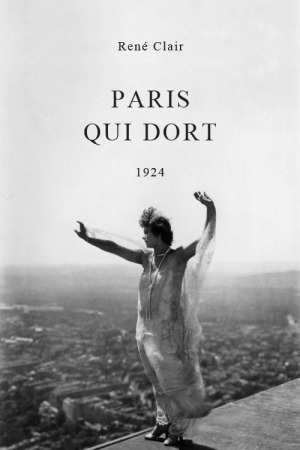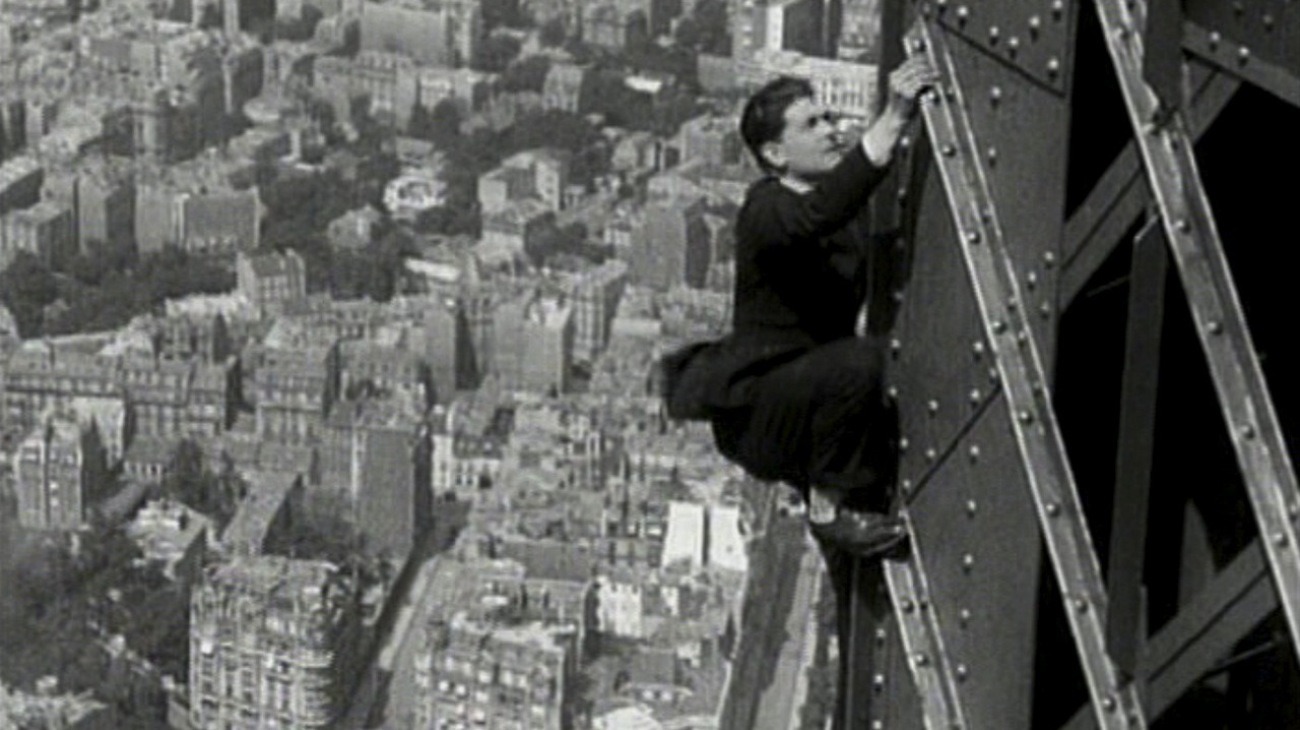
They Shoot Pictures, Don't They? 2008 Edition - #1000
Frequently cited as the world's first science-fiction film by people who apparently regard Georges Méliès as a documentarian (his seminal Voyage dans la lune wasn't even his own first sci-fi picture), René Clair's Paris qui dort nevertheless can lay claim to being the longest science-fiction film at the time of its 1924 creation. Unfortunately, I'm a bit lost as to just how long it was: in the 1950s, Clair substantially recut and reduced the film, and it is this 34-minute version (available in the US on the Criterion Collection DVD of Clair's 1930 musical Under the Roofs of Paris) which I watched for this review, insofar as it is, by the director's wish, the only version that still seems to exist. Without getting into a whole long thing about the rights of the artist to retroactively change his older works, I feel that the mere fact of birthing the French sound cinema doesn't inoculate Clair from the same criticisms that are so easy to throw at George Lucas.
But either way, the 34-minute Paris qui dort (roughly, Paris Sleeping, though the American titles* aren't even close to that, and indeed both kind of spoil the later parts of the story) is the version of the film we have, and it is, I assume, the version that has been seen and loved by enough people to end up as precisely the 1000th best movie ever made. Allegedly. And it is, by all means, a wonderfully appealing little snip of a silent film, like all of Clair's early work a pristine example of poetic realism before poetic realism existed. Though it also feels a bit rushed, especially in the last 10 minutes or so, which feel like a whole lot of wacky hijinks crammed into a space much too small for them. Am I reading into the film the fact that I know it was edited. Perhaps. But as a comedy, it seems like the end of the film descends into the set-up for gags that never get the room to pay off.
Ah, but I am getting ahead of myself. The film's story goes a bit like this: Albert (Henri Rollan) comes down from the top of the Eiffel Tower after his shift as night watchman, to find that everyone in Paris has been frozen in position, apparently sleeping. The only other waking humans he finds are the pilot and passengers from a plane that just landed, and like any normal group of people thrown together in the middle of a seemingly insoluble mystery, they have only one thing on their mind: looting! And so for a few days, they all enjoy the life of luxury that none of them have ever known, taking jewelry and money from the unmoving men and women of Paris, along with plenty of good food and wine, which they take up for a picnic on the highest levels of the Eiffel Tower.
While they're up there, they find a radio broadcast, which leads them to a young woman (Myla Seller) whose uncle (Charles Martinelli) invented the ray that put everyone on the surface of the planet to sleep. He's curiously unperturbed when they all demand that he bring everyone back to life, but when the people of Paris learn that they've been robbed, the gang demands that they be put back to sleep, just long enough to have all of their pockets refilled, but of course things don't go quite that simply, and the final scenes of the film watch a chaotic mess build as the ray gets turned on and off at the worst possible moments.
Clair's directorial debut clearly laid the ground for most of the films he would produce later in the decade, and during his triumphant reign during the early 1930s: a tiny bit surreal, extremely charming, boasting a wicked undercurrent of satire treated in the most gentle way possible, and obsessed with the details of modern life. Indeed, Paris qui dort almost certainly can boast inventing a certain mode of science fiction that seems as concerned with the latest advances of real science as with fantasy: not for nothing do our heroes find themselves saved by airplanes and the Eiffel Tower, which were both still new enough in 1924 to stand in for symbols of a bright shining future. And the film's story is largely concerned with how effect the sleep ray has on society, rather than its in some kind of mad scientist plot. In fact, we never do find out why the scientist created the ray, at least not in the 34-minute version of the film, although we certainly see how the normal people respond to it: selfishly and immorally. Is Clair's point that scientific advances make us worse people? I don't think so; I think he's only arguing that science permits us to give in to our impulses just as easily as it enables our best intentions to reach a greater expression.
Really, though, the film's satiric elements aren't so important as its simple good humor: this is above all things a comic miniature, with virtually all of the film's first 22 minutes devoted to tiny Chaplin-esque vignettes of the awake people poking around either greedily or nicely with the sleeping figures (early on, before the thievery begins in earnest, Albert takes care to mop the sweat from a man standing in the sun, among other similar moments). That's the other thing you can say about Paris qui dort: if it's not the first poetic realist film, it's awfully close to it. And what is poetic realism, but the marriage of humanist storytelling with the techniques of American silent comedy? Admittedly, not all poetic realist films are even slightly funny, but they all more or less stress the same relationship between character and stage that marked the work of Chaplin and Keaton.
But I don't mean to read ahead. For its time, Paris qui dort was a watershed, and if the form we can see it in now feels more than a little rushed and incoherent, there's no denying how very sweet and inventive and pleasant the film was and remains. It is a joyful, alive piece of filmmaking, and a fine minor masterpiece from one of the most important, underrated directors in French history.
But either way, the 34-minute Paris qui dort (roughly, Paris Sleeping, though the American titles* aren't even close to that, and indeed both kind of spoil the later parts of the story) is the version of the film we have, and it is, I assume, the version that has been seen and loved by enough people to end up as precisely the 1000th best movie ever made. Allegedly. And it is, by all means, a wonderfully appealing little snip of a silent film, like all of Clair's early work a pristine example of poetic realism before poetic realism existed. Though it also feels a bit rushed, especially in the last 10 minutes or so, which feel like a whole lot of wacky hijinks crammed into a space much too small for them. Am I reading into the film the fact that I know it was edited. Perhaps. But as a comedy, it seems like the end of the film descends into the set-up for gags that never get the room to pay off.
Ah, but I am getting ahead of myself. The film's story goes a bit like this: Albert (Henri Rollan) comes down from the top of the Eiffel Tower after his shift as night watchman, to find that everyone in Paris has been frozen in position, apparently sleeping. The only other waking humans he finds are the pilot and passengers from a plane that just landed, and like any normal group of people thrown together in the middle of a seemingly insoluble mystery, they have only one thing on their mind: looting! And so for a few days, they all enjoy the life of luxury that none of them have ever known, taking jewelry and money from the unmoving men and women of Paris, along with plenty of good food and wine, which they take up for a picnic on the highest levels of the Eiffel Tower.
While they're up there, they find a radio broadcast, which leads them to a young woman (Myla Seller) whose uncle (Charles Martinelli) invented the ray that put everyone on the surface of the planet to sleep. He's curiously unperturbed when they all demand that he bring everyone back to life, but when the people of Paris learn that they've been robbed, the gang demands that they be put back to sleep, just long enough to have all of their pockets refilled, but of course things don't go quite that simply, and the final scenes of the film watch a chaotic mess build as the ray gets turned on and off at the worst possible moments.
Clair's directorial debut clearly laid the ground for most of the films he would produce later in the decade, and during his triumphant reign during the early 1930s: a tiny bit surreal, extremely charming, boasting a wicked undercurrent of satire treated in the most gentle way possible, and obsessed with the details of modern life. Indeed, Paris qui dort almost certainly can boast inventing a certain mode of science fiction that seems as concerned with the latest advances of real science as with fantasy: not for nothing do our heroes find themselves saved by airplanes and the Eiffel Tower, which were both still new enough in 1924 to stand in for symbols of a bright shining future. And the film's story is largely concerned with how effect the sleep ray has on society, rather than its in some kind of mad scientist plot. In fact, we never do find out why the scientist created the ray, at least not in the 34-minute version of the film, although we certainly see how the normal people respond to it: selfishly and immorally. Is Clair's point that scientific advances make us worse people? I don't think so; I think he's only arguing that science permits us to give in to our impulses just as easily as it enables our best intentions to reach a greater expression.
Really, though, the film's satiric elements aren't so important as its simple good humor: this is above all things a comic miniature, with virtually all of the film's first 22 minutes devoted to tiny Chaplin-esque vignettes of the awake people poking around either greedily or nicely with the sleeping figures (early on, before the thievery begins in earnest, Albert takes care to mop the sweat from a man standing in the sun, among other similar moments). That's the other thing you can say about Paris qui dort: if it's not the first poetic realist film, it's awfully close to it. And what is poetic realism, but the marriage of humanist storytelling with the techniques of American silent comedy? Admittedly, not all poetic realist films are even slightly funny, but they all more or less stress the same relationship between character and stage that marked the work of Chaplin and Keaton.
But I don't mean to read ahead. For its time, Paris qui dort was a watershed, and if the form we can see it in now feels more than a little rushed and incoherent, there's no denying how very sweet and inventive and pleasant the film was and remains. It is a joyful, alive piece of filmmaking, and a fine minor masterpiece from one of the most important, underrated directors in French history.






